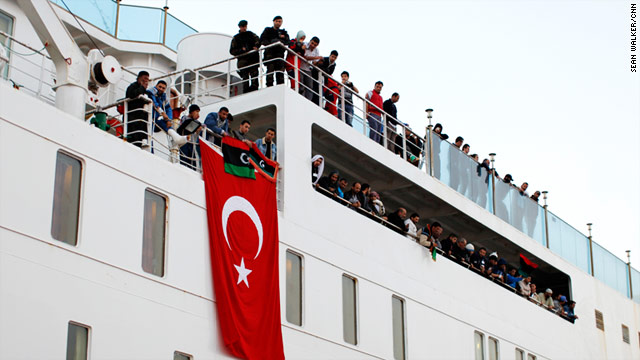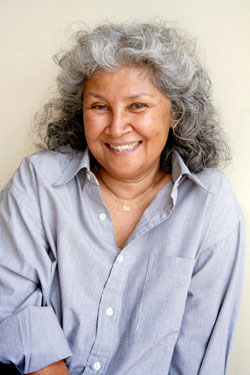
Datuk Faridah Merican
DATUK Faridah Merican has been in the arts scene for more than 50 years and is considered a pioneer of the Malaysian theatre industry. With her husband, director
Joe Hasham, the “
first lady of the stage” co-founded
The Actors Studio in 1989.
She and Joe also head the Kuala Lumpur Performing Arts Centre (
KLPac), which opened its doors in 2005 following the destruction of
The Actors Studio at Plaza Putra (below Dataran Merdeka) by flash floods two years earlier. The Actors Studio now holds performances in
Lot 10 Kuala Lumpur and in
Singapore, with plans afoot for a
performing arts centre in Penang in the third quarter of 2011. Faridah is KLPac’s executive producer, while Joe is the artistic director.
Faridah, who was awarded the
BOH Cameronian Lifetime Achievement Award in 2004, still performs on stage. She speaks to
The Nut Graph in her office at KLPac on 11 March 2011.
When were you born, and where did you grow up?
I was born on 25 Oct 1939, which makes me a Scorpio and a Rabbit. I was born in Penang and I grew up in Kampung Baru in Air Itam. I went to St George’s Girls School, both primary and secondary.
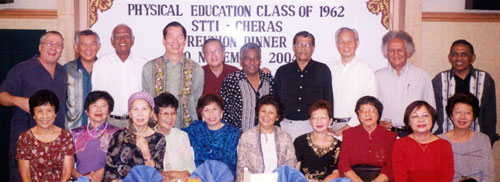
At her STTI reunion in 2004
After I left school, I went to the Kota Baru Teachers Training College in Kelantan in 1957, and I came to Kuala Lumpur in 1959 to begin work as a teacher. Two years later, I applied to go the Specialist Teachers Training Institute (STTI) in Cheras, and trained as a physical education teacher. However, I didn’t get to teach physical education in a secondary school because I was not a university graduate.
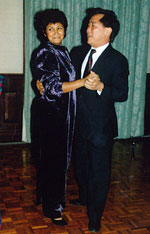
Dancing with Patrick Teoh
At the time, I was already doing a lot of radio and TV work as a freelancer. I fell in love with broadcasting. I continued teaching for another couple of years after STTI, and then left teaching to become a full-time freelancer with radio and TV.
In my early days of being in Kuala Lumpur, while doing part-time work with Radio Malaya, I already started my relationship with the theatre. In radio, there were people like Tun
Syed Alwi (Syed Hassan),
Rahim Razali, Krishen Jit,
Tan Jin Chor and John Machado, those who were into the amateur theatre scene in KL. I began my journey as an actor because of them.
I became a single mother in 1969, and I needed to get a “proper” job so that I didn’t have to work from 6am to midnight! So I applied and got a job with an ad agency, SH Benson. I am still with that agency 42 years later. It is now called Ogilvy & Mather, and I am currently a non-executive member of the board. So I was doing radio and television and theatre while having a full-time job. How I did it, God only knows! But it was wonderfully enriching.
How did The Actors Studio come about?
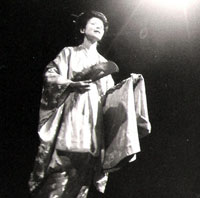
Faridah in Narukami, directed by Kee Thuan Chye, performed in the 80s at Experimental Theatre, Universiti Malaya.
While I was working as a freelance actor, I got involved with the Malaysian Arts Theatre Group headed by Syed Alwi, and with another group, Kami, with the likes of
Kee Tuan Chye,
KS Maniam and
Sabera Shaik. But those never quite lasted.
By the mid-80s, Joe walked into my life, and in 1989 we formed the Actors Studio. We opened our first official venue in 1995, because we realised that we needed our own space. Sadly, if you do not have your own space, it’s difficult to do theatre on a full-time basis; you would always have to go to somebody’s space and book it, and potentially get kicked out. So opening our own space felt like the correct thing to do.
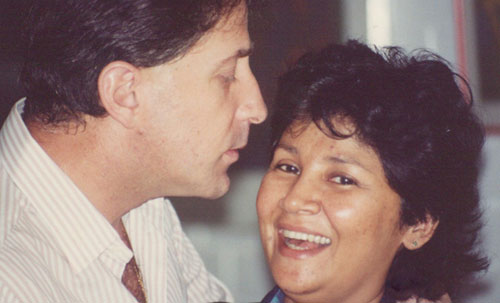
Faridah and Joe in 1990
I had worked all my life, so I had savings; and Joe had
his savings, so we pooled our money together and built our own space, without help from any of the banks. Because you go to the banks for a loan and they’d ask you to show them your three-year projections of your profits. For theatre?
(Laughs)
What are some of your strongest memories growing up?

Faridah in 1951
I remember, because I was the youngest sibling, I would be dragged around to Quran classes, and if I didn’t pay attention and was too busy sucking on asam boi (sour plum), I would get a pinch from my eldest sister
(laughs).
When I was growing up we used to cycle from our house to school. And the exciting thing was that’s when you met the boys! So it was a lot of fun. The other thing was when I turned 17, I had my birthday dance, ballroom-style, like a prom. You all don’t have that these days! You have to go to a nightclub to dance, and then the police would come and raid you.
But my nicest memory is of after the Japanese occupation, when my father came home and bought the family a car, a
Morris Eight. I can still remember the number plate! To us, that was like a dream come true. My father was only a teacher with seven children, so it couldn’t have been easy for him to have done that. My mother, a housewife, was not educated in a schooling sense, but she was smart enough to know how to manage my father’s salary, even to the extent of buying us a car. My mother was keeper of the purse!
Can you trace your ancestry?
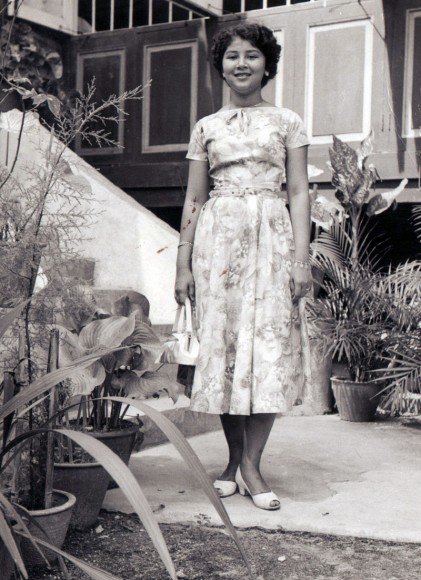
Faridah in the 1950s
I am a few generations after the first person who was the Kapitan Keling of Penang. He was a merchant from India who came to Penang to set up his business, and even today we have Jalan Kapitan Keling and
Merican Road, which means we really made quite an impact on the history of Penang.
My mother’s side was also from the Mamak and Mami community, i.e. Indian Muslim, whose ancestors all came from India. Truly Penang was ruled by the Mamak community, and this is something we’re very proud of. Nowadays people tend to shy away from being referred to as a Mamak. It’s nothing to be ashamed of at all. We were, and are still, good people.
What do you remember of Merdeka and 13 May 1969?
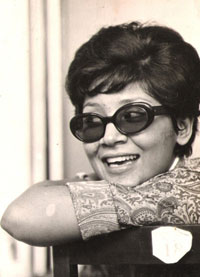
A younger Faridah sporting a short hairdo, 1965
Merdeka I cannot relate very much to, because I was in college at that time in Kota Baru. I remember feeling sadness at seeing the Union Jack being lowered. We grew up during British rule, and for the ordinary people like us, we were very happy then.
But it was also quite astounding to see and hear Tunku Abdul Rahman declaring “Merdeka! Merdeka! Merdeka!” Tunku, for many people of my generation, did a great job of having the smooth transition from British rule to Independence. That’s the kind of guidance we want, I suppose, for any country, because we didn’t have to fight for it. It was handed to us on a platter: “Here you are, guys, all the best with it — may your independence be fruitful.”
I don’t remember too much more than that, but these memories, thankfully, still exist because of that iconic picture of Tunku on Merdeka Day.
As for 13 May, I was 30 years old, and I remember the fear, and the rationing of food. I remember cars burning, but I don’t really remember death. I was still working in Radio Malaysia at the time and we needed special passes, so it was really rather exciting, though that isn’t the best adjective to use because it was also very frightening.
The thing is, why does the country not allow us to talk about
13 May? It would be a good thing to remember, a lesson learnt, especially for people who want to stir up trouble and bring up racial issues. This country is unique, we are all trying to live under one roof, and one wrong move would spoil it for everyone. So we must — as they keep telling us over and over — respect one another, understand each other’s cultures.
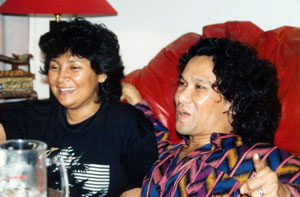
Faridah in 1989
This has to start, I believe, at home and in school. Because if this or that is not allowed in school, or “I don’t want to sit beside this person because of their skin colour or their smell or what they eat” — well, that certainly was not the way
I grew up. Why can’t we all sit together and be congenial? Whether or not you like a person should not be because of his or her race or religion, but because of the
quality of the person.
What aspects of your identity do you struggle with?
I don’t think I’ve struggled with any aspect. I am just sad that sometimes, my religion is being used in a way that it should not be used, like minding other people’s businesses. But I’ve not suffered myself, thankfully.
What are your hopes for the future generations of Malaysia?
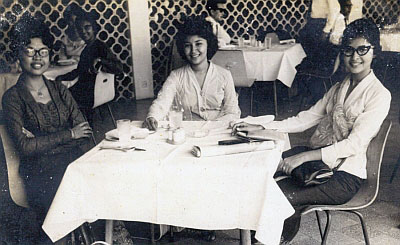
In the Philippines. Faridah and her elder sister Marina (right) were part of Badan Kebudayaan, a dance company set up by the Prime Minister's Department in the 1960s. On left is fellow dancer Zainab Kassim.
This country is truly governed by the politicians. It is in their hands, the responsibility for the way this country will move forward. And if we are in the hands of not very clever people, we will be in trouble.
I don’t think that there is only one group of politicians who can make it happen for us. Whether it is one party or another, they have their strengths and weaknesses. So they must
focus on their strengths and
correct their weaknesses.
I truly hope the politicians won’t spoil things for Malaysians and the country. Instead, they should learn, and they should listen to the people.




